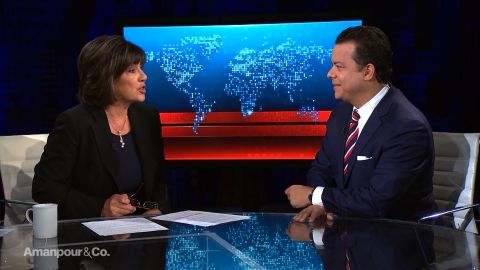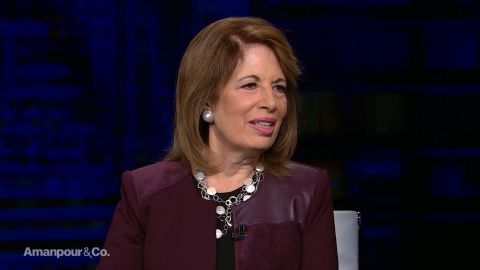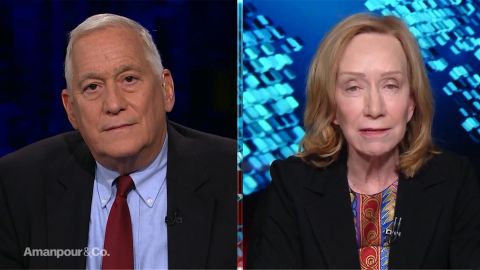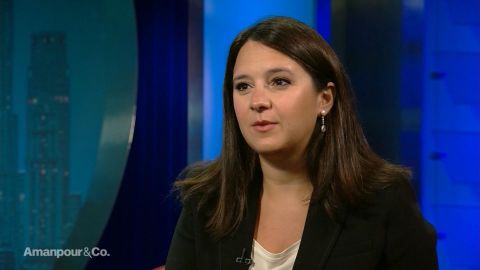Read Transcript EXPAND
CHRISTIANE AMANPOUR: And now, for the relationship between the president and the press. Remember Thomas Jefferson’s famous dictum? “Were it left to me to decide whether we should have a government without newspapers or newspapers without a government, I should not hesitate a moment to prefer the latter.” Now that means a lot to our next guest, of course. She’s Bari Weiss, an Op-ed staff editor, and writer for “The New York Times”. She calls herself a political centrist, sometimes the leaning left, sometimes leaning right. She was born and raised in Squirrel Hill, Pittsburgh where 11 Jewish worshippers were gunned down less than two weeks ago. Bari spoke to our Hari Sreenivasan about the election results and how terror came to her own backyard.
HARI SREENIVASAN: What explains the outcome last night?
BARI WEISS, OP-ED WRITER AND EDITOR, THE NEW YORK TIMES: This country is — I’m the first to say this. We’re in the midst of a kind of cold civil war. And the outcome last night was you can sort of conceive of it as a battle that ended in a stalemate. You know, lots of people predicted that the Democrats were going to take the House and they did. But we really saw was sort of the solidification of the Republican party as the party of Trumpism. Moderate Republicans lost last night. Moderate Republicans who stood up to Donald Trump lost. And that is a very very troubling sign for the health of a country that’s sort of built on a two party system.
SREENIVASAN: You know, and for our audience, give us some context. Where do you identify yourself or find yourself in a political spectrum?
WEISS: I think of myself as being in the center. Some people see me as sort of a Democrat in the mold of a Scoop Jackson or a Daniel Patrick Moynihan. Others see me as a Liberal Republican. I don’t spend much time thinking about what party I belong to. I’ve always been registered as an Independent. I’ve always voted for people of both parties. I see myself as a sort of Classical Liberal. And frankly, I see myself in the space where I think a lot of other Americans do which is moderate, taking things issue by issue, not wanting to sort of just ascribe wholeheartedly to any political orthodoxy. And right now, frankly, politically homeless and unrepresented by both parties in this country.
SREENIVASAN: You’ve had powerful voices in the — what would have been a traditionally Republican party from George Will to Max Boot to, you know, lots of others saying outright, Michael Gerson saying, “Vote for Democrats. Get these guys out of office.” But between them all, they do not have the power anymore especially in terms of last night’s results from the Senate.
WEISS: Well, let’s not underplay what happened last night. I mean the Democrats took the House. That was big. I mean —
SREENIVASAN: Isn’t that expected in an off-year election that whatever the in party is that there would be gains from the opposition?
WEISS: Sure. I’m just saying that we can’t — I don’t want to undersell what happened last night. There’s finally going to be a check on the presidency of Donald Trump and that’s hugely, hugely significant. I think that that’s a game changer. The fact that — you know, people like to point out that they’re never Trumpers like Max Boot and George Will and Bret Stephens my colleague, you know there’s that line. I think Max Boot coined it. There’s enough of us to fill a dinner party, a political party. Maybe that’s true but the fact that that’s the case, I sort of don’t understand the criticism of that which is to say those people, unlike a lot of people who are in political power in the Republican Party, have the freedom to think freely and to speak their minds. And they’re doing it. And I think that they should be praised for it and not sort of — there’s this sort of feeling that they should be, you know, not condemned but criticized because they’re not really representative. Well, their job was only ever to represent themselves. They’re public intellectuals and writers. And they’re doing their job of that.
SREENIVASAN: How much of this climate do you attribute to most single issue voters? It seems white evangelicals think that abortion is the issue to go to the polls for, how Supreme Court might protect or challenge those rights in the future. You’re familiar with people — Americans who believe Israel is the defining issue of our time and Trump support. There’s been a lot of people who said, “You know what, I’ve pinched my nose but this one single issue is important to me and I will give Donald Trump his transgressions.”
WEISS: Right. I think that there’s a lot of people in this country who have chosen to place particular policies. Notably, the Supreme Court and the Supreme Court picks over values and over, you know, the very obvious things that this president is doing to degrade the character and the sort of common civic language, the social fabric of this country. I think that that’s a bargain that’s not worth making. Other people make other calculations. I think the other thing that’s going on is that a lot of people just feel like I don’t want to be ruled by those other guys. And there’s very much a sense of that, at least among the people that I talk to. And that’s certainly the case among a lot of Conservatives I know who are still — who still pulled the lever for Republicans yesterday, which is to say they might be convinced if there was someone like a Mike Bloomberg or more moderate person on the Democratic ticket in 2020. But they sort of feel like I’m not sure that it’s worth it for me to give up all of my policy principles for a party that doesn’t really respect or understand mere things that I’m deplorable.
SREENIVASAN: It seems, as you pointed out earlier, this is kind of a death of moderation and an increase in tribalism.
WEISS: Yes.
SREENIVASAN: As long as it’s not the other team, fine. Right? I’ll tell her all kinds of stuff as long as it’s not the other guy, regardless of what their ideas actually were, what you agree with them on.
WEISS: Yes. I mean the Democrats have an enormous opportunity right now. This is a moment all over the world and not just in this country in which nationalism and specifically far-right nationalism is on the rise. Trump and the party of Trump are telling a, in my view, very anti-American story about the kind of nationalism this country is about. They’re telling a story that’s about blood and soil nationalism, an idea that immigrants are alien invaders to this country. The notion that, you know, we’ve always had presidents in my lifetime that celebrated the fact that America is a country built by immigrants. It is a country of immigrants. That’s who we are from the founders. That story is right now up for grabs and the Democrats are not grabbing it. In my view, they have an opportunity to tell an expansive story about who we are as Americans, not who we are in terms of our tiny slots of racial and gender and really just lanes but who we are as Americans writ large. I don’t see them doing that yet and I think there’s a huge opportunity for them to do so. And if they do so, they can win back that middle that’s right now homeless.
SREENIVASAN: What happened? Speaking of the increased hate, we saw pipe bombs being sent to different people and institutions, we saw the massacre in the Synagogue but also sort of —
WEISS: With the shooting at Kroger Supermarket.
SREENIVASAN: The shooting at Kroger.
WEISS: Two black grandparents.
SREENIVASAN: Exactly. Were these all things that we’ve now forgotten under the bridge or you know it has been kind of subsumed by the midterm election news cycle? Do those events shape how we think going forward?
WEISS: They certainly shaped how I think going forward. It certainly shaped how everyone in my community in Pittsburgh who are still shattered and traumatized from this massacre thinks and certainly, informed I think the way that they voted yesterday in the election. You have to be willfully blind or delusional to think that these incidents don’t have any connection to the political rhetoric coming out of this White House and the refusal to turn down the temperature on the tribalism that’s going on in this country. And the hate and the demonization of the other, that is what this president just ran on and has been running on for two years. So to suggest that there’s not a connection between this kind of violence in the presidency, I think is ridiculous.
SREENIVASAN: We should point out to our audience that you grew up in that community. You had your (INAUDIBLE) at that Synagogue where this massacre occurred. How is this changing you?
WEISS: It always will change a person. I think to see people you love, not only murdered but shattered by violence like this, just seeing it up close is different than seeing it on the news. But frankly, you have to have been not paying attention to what’s been going on for the past two years to life the imagination to imagine something like this happening in your own community. Even in the weeks before this happened, all of these places, Las Vegas, Parkland, Charleston that now signify mass murder. One of the things that are deeply frustrating for me is in the wake of these tragedies, it becomes almost numbing. We go through the routine of first we see it on Twitter then it breaks — then it comes through in places like “The New York Times”, then we hear about all of the innocents who were slaughtered. And then we make T-shirts and then we move on. That has to stop. People need to wake up. We abolished slavery in this country. Don’t tell me that we can’t get rid of (INAUDIBLE) reservoir.
SREENIVASAN: You know, you said that’s central tenets to your faith and welcoming the stranger, dignity for all human beings, equality under the law, respect for dissent, love of truth. These are all core values of your faith but it seems that they’re starting to take a back seat around the country.
WEISS: They are and I’m alarmed by that. And I think that we have the responsibility in our everyday lives to sort of recover those virtues. Obviously, we should be electing people to public office to represent those values. But I feel that even in a very personal and intimate way, this presidency has changed me in the way that I just moved through my everyday life and try and be a more — Trump leads the way. And what I mean by that is Trump leads the way, he shows us exactly what not to be. He’s cruel, we should be kind. He’s indecent, we should be decent. He’s ungenerous, we should be generous. We need to be modeling anti-Trump values in our everyday life. I think that that’s really important beyond who we vote for at the polls.
SREENIVASAN: You’re also simultaneously working on a book about civility are the necessary pre-conditions, irrevocably damaged. Can the United States get to a point again where you and I can disagree agreeably about matters that matter?
WEISS: Yes. We have to and we have to model it. The thing that I think is strange about the times that we live in is that we’re living in a kind of paradox when it comes to free thinking and free speech. In the political arena, seemingly, anything can be set right now. You can talk about grabbing women by the genitalia and become president of the United States. You can be a supporter of white nationalism like Steve King and win public office. You can be like Danny Davis in Illinois and talk about how Farah Khan is an outstanding man, a man who has — Farah Khan, who has called Judaism a gutter religion, who has gone to Iran and proclaim death to Israel in Farsi and win for Congress. That is what’s going on in our political sphere. And yet in the cultural sphere, which is largely controlled by the left, there’s a vanishingly small number of things that can be talked about freely and openly, things like gender, things like biological difference. And I think that that’s really really problematic.
SREENIVASAN: All right. Bari Weiss, “New York Times”, thank you so much.
WEISS: Thank you.
About This Episode EXPAND
Christiane Amanpour speaks with political commentator John Avlon, Reps. Jackie Speir and Dan Crenshaw, and presidential historian Doris Kearns Goodwin & Amanpour and Company co-host Walter Isaacson about the results of the U.S. midterm elections. Hari Sreenivasan speaks with New York Times Op-Ed writer and editor Bari Weiss.
LEARN MORE




